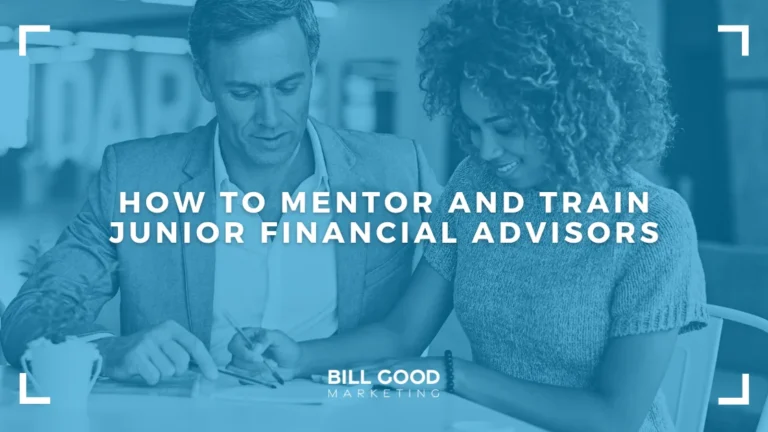A new advisor walks into the office, eager, bright-eyed, and ready to change lives.
They’ve passed their Securities Industry Essentials (SIE) exam. They have a good understanding of FINRA regulations, maybe even started their CFP® coursework.
They know the textbook definition of investment management, a general idea of how capital markets work, and some of the theories of wealth management.
And yet—They’re not ready.
- Not ready to sit across from a high-net-worth business owner and talk about estate planning.
- Not ready to promote referrals without feeling awkward.
- Not ready to build a client base, lead client meetings, or turn conversations into long-term client relationships.
- Not ready to connect the dots for a prospect on how your team can help.
So, they do what most junior advisors do.
They take notes. They help with admin. They attend meetings. They listen. They cold call a bit here and there. They may even do the data entry on your planning software. They wait.
But waiting isn’t a development program.
You wouldn’t teach someone to swim by having them just watch from the deck. And you wouldn’t train a financial advisor by keeping them in the background for years, hoping that one day they’ll “pick it up.”
Whether you are at an independent advisory, RIA, or broker dealer, you will need to truly mentor a younger advisor. If you want to build the next generation of elite advisors—rainmakers, trusted fiduciaries, and top producers—you need a real training program.
One that teaches more than cold calling and technical knowledge.
One that transforms a junior advisor or young Certified Financial Planner™ into a true pro who can generate new business, build trust, and thrive in a competitive industry.
Let’s break down some of the steps to do that.
The Harsh Reality: Why Most Junior Advisors Fail
The numbers don’t lie.
- Over 90% of financial advisors don’t make it past their first three years.
- Only 15-16% remain in business by year five.
- New advisors spend just 7 hours per week with clients, compared to 10.2 hours for experienced advisors.
Why do so many fail?
It’s not because they lack intelligence. It’s not because they aren’t hard workers. It’s because they’re thrown into the deep end without a system. Or they are never thrown into it at all.
Most advisory firms don’t have a structured development program.
They don’t teach new advisors how to build client relationships, generate referrals, or confidently lead a financial planning conversation.
Instead, junior advisors spend their first few years taking notes, doing administrative work, and hoping to “pick it up” over time.
But waiting isn’t a development plan. And without the right mentorship and training, most junior advisors never get past the starting line.

Laying the Foundation for Your Junior Advisor
Most senior advisors don’t train their junior.
They onboard. They hand out a compliance manual, a broker-dealer agreement, a login to the firm’s financial planning software. They walk through registrations and set the junior advisor loose in a world they barely understand.
That’s not training. That’s paperwork.
A true advisor development system starts with clarity—defining the role, setting expectations, and providing a clear career path. Without that, your new advisor isn’t just lost; they’re failing before they begin.
1. Role Definition & Expectations
The mistake? Treating a junior advisor like an average assistant.
They’re not there to push paper, fix calendar conflicts, or sit quietly in meetings. The advisor role must be defined with precision. We recommend having your junior advisor focus on the following:
- Client Service: Assist with financial goals assessments, follow up after client meetings, and provide proactive communication.
- Technical Growth: Shadow senior advisors with weekly check-ins on what they’ve learned. Understand some key aspects to each area of your clients’ financial lives, including estate planning. Truly understand the meaning of being a fiduciary as an independent advisor.
- Business Development: Learn the art of prospecting, manage a pipeline of leads, schedule in-person meetings, and create profiles during initial calls with new clients.
And the most important expectation? They must own their growth.
No one becomes a rainmaker by waiting for permission.
2. Branding & Positioning Your Junior Advisor
A client’s first impression of your new advisor matters.
We see it all the time. An advisor introduces their junior as “just getting started” or “helping out behind the scenes.”
It sounds harmless, but it’s adding hurdles to building their trusted advisor brand.
Why?
Because it instantly tells the client, “This person isn’t ready to help you.”
Instead, the positioning should be deliberate:
- “Sarah is specializing in wealth management for business owners. In particular, her focus right now is on ensuring they navigate their succession planning smoothly.”
- “Mark is specializing in financial services for highly compensated professionals nearing retirement. He’ll be the one we turn to as we negotiate the specific investment management strategies related to your RSUs.”
The words you use shape how clients perceive them.
If you introduce them as an assistant, they’ll stay an assistant.
If you introduce them like an advisor, they’ll become one.
3. A Structured Training Program: What They Need to Learn
Most junior advisors don’t fail because they lack intelligence. They fail because they don’t have a structured development program that prepares them for real-world advising.
They need training in:
- The Business Side of Advising – Not just numbers, but people. How to ask for referrals, conduct client needs assessments, inspire teammates, and position themselves for long-term success.
- The Technical Side – Estate planning, securities regulations, investment strategies, RIA compliance, tax strategies, etc. Not just memorizing but applying it in live client discussions.
- The Sales Side – How to build a client base, handle objections, and convert interest into commitment.
And here’s the secret: Classroom learning isn’t enough. They need real conversations, real at-bats, and real feedback from those who’ve walked this road before.
No junior advisor has ever succeeded by sitting in the back of the room.
They succeed by stepping up.

Helping your Junior Advisor Master Client Relationships & Sales
A junior advisor doesn’t fail because they don’t understand financial planning.
They fail because they don’t understand people.
A client doesn’t hire an advisor because they passed their CFP® exams. A client hires an advisor because they trust them. Because in a single conversation, they felt heard, understood, and confident that this person could guide them toward their financial goals.
Trust is built. Conversations matter. And yet, most new advisors spend their early years buried in working with software, not learning how to actually talk to clients.
You can’t grow a client base from a desk.
You can’t develop a rainmaker without real-world conversations.
1. Developing Strong Communication Skills
There are two types of financial advisors:
- The one who rattles off investment returns, tax strategies, and describes the intricacies of Monte Carlo simulations.
- The one who listens, asks the right questions, and makes the client feel like the most important person in the room.
Only one of them gets most of the business.
A junior advisor must learn to:
- Control the conversation. Not with jargon, but with confidence.
- Ask real questions. Not just “How much do you have invested?” but “What worries you most about your financial future?”
- Lead with clarity. Clients don’t want to hear about an optimized asset allocation strategy. They want to know, “Am I going to be okay?”
And the only way your new advisor will learn? Practice.
Not once. Not twice. But over and over again until it’s second nature.
2. Learning to Prospect & Generate Leads
A financial advisor who doesn’t generate business is really just a service person.
That’s why business development is the single most important skill a new advisor must master. Not someday. Not after a few years. Now.
The best training programs teach:
Referrals as a System, Not a Hope
Clients will not magically send referrals. You must build client relationships where they naturally introduce you to others.
The approach?
Promoting, NOT asking for referrals.
Instead of “Who do you know who needs financial help?” train them to say something to the effect of :
“Many of our best clients come from introductions. If you ever meet someone worried about their investment management strategy, feel free to send them our way.”
Strategic Partnerships: COIs, Not Cold Calls
The best independent advisors don’t grow their business alone. They leverage CPAs, attorneys, estate planners, etc.—building referral networks that consistently send new business.
A junior advisor should be meeting one to two COIs per week—not just to “network,” but to develop relationships that lead to qualified introductions.
Event & Seminar Training
There’s a reason top advisory firms still rely on in-person client events and seminar marketing. Done right, they bring in new clients faster than any marketing campaign.
But standing in front of a room full of business owners and compellingly speaks about why to turn to them for succession planning isn’t something a junior advisor learns overnight.
They must be trained to:
- Deliver a message that resonates. Not “Here’s what we do,” but “Here’s why we are uniquely qualified to solve your problems.”
- Tell stories, not sell products. Clients resonate with real-world case studies, not financial details.
- Handle objections with confidence. When someone challenges their expertise, they must lean into the conversation—not retreat.
3. Developing a Strong Sales Process with Your Junior Advisor
A prospect is not a client.
Too many junior advisors assume that because they can explain the intricacies of a put option, everyone will sign on. They won’t.
They must be moved through a structured process:
- Discovery Meeting: The goal? Find the real issue. No pitching. No proposals. Just listening, asking questions, and diagnosing the client’s true concerns.
- Second Meeting: Present solutions, not products. The meeting should end with a simple question: “Do you see how this strategy would help you?”
- Commitment: Not a “follow-up” or “think it over.” A real conversation where they make a decision.
Every senior advisor knows that the close is earned long before the final meeting. It happens in the relationship-building, the problem-solving, and the ability to lead clients to clarity.
A junior advisor who learns this early will build a career that lasts.
One who doesn’t will never make it past the first few years.

How to Implement a Formal Mentorship & Accountability System
A junior advisor doesn’t become great by accident.
They don’t wake up one day with a fully booked calendar, a thriving client base, and the ability to navigate financial planning, investment management, and client relationships with ease. In fact, if your plan is to just hand over the keys to all the above, you are handing over the keys to a now dying business.
They must learn. They need to practice. They prove they can grow.
But only because someone showed them the way.
The problem?
Most firms hire a new advisor, give them a desk, and say, “Shadow our best people.”
That’s not mentorship. That’s observation.
If you want an advisor who can prospect, close, retain clients, and drive new business, you don’t let them watch from the sidelines.
You give them a structured development program with real mentoring, accountability, and clear benchmarks for growth.
Because without that?
They will fail.
The Role of Senior Advisors in Mentoring
A senior advisor has two choices.
They can spend their career doing everything themselves—meeting clients, handling portfolios, taking every referral personally, and never letting go.
Or they can train the next generation, build a team, and create an advisory firm that grows beyond them.
The firms that win?
They choose mentorship.
A formal mentoring system should include:
- Assigned mentor relationships. A junior advisor should have a dedicated mentor—someone who is invested in their success, not just available when they have a question.
- Weekly coaching sessions. Not occasional check-ins, but structured, in-person meetings where real feedback is given.
- Live client interaction. The new advisor should not just sit in the room. They should participate. Ask questions. Work their way to leading parts of the conversation.
A senior advisor should not just teach them financial services.
They should teach them how to think.
How to ask the right questions.
How to see past the statements and into the client’s true concerns.
How to build trust, confidence, and relationships that last a lifetime.
Setting Clear Performance Metrics & Milestones
“Just work hard and you’ll figure it out.”
That’s not a plan.
That’s a guess.
A junior advisor needs clear, measurable benchmarks—specific goals that track their growth and force them to develop the skills they need.
A successful advisor development program includes:
- Activity metrics: How many in-person client meetings, cold calls, or LinkedIn messages are they generating?
- Pipeline goals: How many new clients, referrals, or business development opportunities are they bringing in each month?
- Sales benchmarks: Are they consistently moving prospects through the discovery, proposal, and commitment process?
No more vague “keep at it” advice.
A junior advisor must know exactly what is expected, exactly what success looks like, and exactly how to reach it.
The Power of Accountability: Weekly & Monthly Check-Ins
The firms that succeed don’t just train new advisors. They hold them accountable.
- Weekly check-ins: Short, tactical meetings to review key numbers—calls made, meetings scheduled, proposals delivered.
- Monthly performance reviews: Deep dives into wins, challenges, and where improvement is needed.
- Quarterly assessments: Clear discussions about progress toward career milestones—FINRA registrations, practice management skills, client acquisition numbers.
Without accountability, growth is optional.
With it?
A junior advisor turns into a rainmaker, a trusted fiduciary, and a producer who builds a firm—not just a book of business.
The Junior Advisor Who Has a Plan, Wins.
Mentorship without accountability is just advice.
Accountability without mentorship is just pressure.
A true professional development system provides both—the wisdom of experience, the structure of a plan, and the expectation of real results.
Because in the end, a junior advisor doesn’t just need support.
They need a path.
A structured, disciplined, proven path that takes them from new business chaser (but never catcher) to trusted financial expert—step by step, meeting by meeting, year by year.
And the firms that create that path?
They don’t just build advisors.
They build a legacy.

Creating the Next Generation of Financial Advisors
Most junior advisors don’t fail because they lack intelligence. They fail because they lack a system.
Without structure, they struggle to prospect. They hesitate in client meetings. They lack confidence when it’s time to close. They wait for referrals instead of driving new business.
And too often, they leave the industry before they ever had a chance to succeed.
But it doesn’t have to be this way.
The most successful advisors weren’t born knowing how to build relationships, lead clients through tough financial decisions, or close high-net-worth prospects.
They were trained.
They had mentors who guided them, a system that worked, and a development program that gave them the skills they needed—not just to survive, but to thrive.
And the firms that invested in them? They didn’t just build advisors. They built a legacy.
Great Advisors Are Made, Not Found
Training a junior advisor isn’t about throwing them into the deep end and hoping they swim. It’s about giving them the tools to succeed—because success in this business isn’t a mystery.
It’s a process.
It’s knowing:
- How to lead a discovery meeting that uncovers real client needs.
- How to confidently move prospects through a structured sales process.
- How to handle objections and close without hesitation.
- How to build deep client relationships that lead to lifelong retention.
These are not talents. They are learned skills.
Yet too many new advisors are left to figure it out on their own. They aren’t given a advisor development program that shows them what actually works.
That’s why we built The Asset Accelerator. A financial advisor sales training program that has helped thousands of financial advisors master the business—faster, easier, and with more confidence.
The Financial Advisors Who Succeed Are the Ones Who Are Trained to Win
Every firm has a choice.
They can let junior advisors stumble through years of frustration, hoping they’ll pick up the right habits along the way.
Or they can give them the roadmap—a system that accelerates their growth, builds their confidence, and turns them into top performers.
Firms that invest in training don’t just develop advisors.
They create leaders. Rainmakers. Trusted professionals who drive new business, build lasting client relationships, and grow the firm for years to come.
At Bill Good Marketing, we believe the next generation of financial advisors deserves better. They deserve a system that works. They deserve mentorship that matters. They deserve a training program that gives them the skills to succeed—not someday, but now.
That’s what Asset Accelerator is all about. It’s for the firms who want their next generation to be the best generation.
Because success isn’t luck.
It’s built.
Are you ready to build it?
About the Author

Andrew D. White is the Director of Marketing at Bill Good Marketing, a firm with over 45 years of experience helping financial advisors scale their businesses. With deep expertise in advisor marketing, client acquisition, and retention strategies, Andrew specializes in creating high-impact campaigns that drive measurable results. His insights are grounded in real-world experience, working alongside top-performing advisors to refine prospecting, branding, and practice management strategies.




